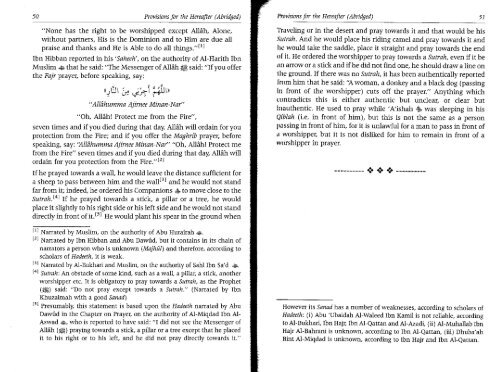Provisions for the Hereafter (Zaad Al-Ma'ad)
Provisions for the Hereafter (Zaad Al-Ma'ad)
Provisions for the Hereafter (Zaad Al-Ma'ad)
Create successful ePaper yourself
Turn your PDF publications into a flip-book with our unique Google optimized e-Paper software.
50 <strong>Provisions</strong> <strong>for</strong> <strong>the</strong> <strong>Hereafter</strong> (Abridged) <strong>Provisions</strong> <strong>for</strong> <strong>the</strong> <strong>Hereafter</strong> (Abridged) 51<br />
"None has <strong>the</strong> right to be worshipped except <strong>Al</strong>lah, <strong>Al</strong>one,<br />
without partners, His is <strong>the</strong> Dominion and to Him are due all<br />
praise and thanks and He is Able to do all things."t r l<br />
Ibn Hibban reported in his 'Saheeh', on <strong>the</strong> authority of <strong>Al</strong>-Harith Ibn<br />
Muslim that he said: "The Messenger of <strong>Al</strong>lah, said: "If you offer<br />
<strong>the</strong> Fajr prayer, be<strong>for</strong>e speaking, say:<br />
«<strong>Al</strong> I [...).43;1st»<br />
"<strong>Al</strong>lahumma Ajirnee Minan-Nar"<br />
"Oh, <strong>Al</strong>lah! Protect me from <strong>the</strong> Fire",<br />
seven times and if you died during that day, <strong>Al</strong>lah will ordain <strong>for</strong> you<br />
protection from <strong>the</strong> Fire; and if you offer <strong>the</strong> Maghrib prayer, be<strong>for</strong>e<br />
speaking, say: '<strong>Al</strong>lahumma Ajirnee Minan -Nar" "Oh, <strong>Al</strong>lah! Protect me<br />
from <strong>the</strong> Fire" seven times and if you died during that day, <strong>Al</strong>lah will<br />
ordain <strong>for</strong> you protection from <strong>the</strong> Fire." 121<br />
If he prayed towards a wall, he would leave <strong>the</strong> distance sufficient <strong>for</strong><br />
a sheep to pass between him and <strong>the</strong> wall [31 and he would not stand<br />
far from it; indeed, he ordered his Companions .* to move close to <strong>the</strong><br />
Sutrah.E 41 If he prayed towards a stick, a pillar or a tree, he would<br />
place it slightly to his right side or his left side and he would not stand<br />
directly in front of it.E 51 He would plant his spear in <strong>the</strong> ground when<br />
in Narrated by Muslim, on <strong>the</strong> authority of Abu Hurairah 4.<br />
[2] Narrated by Ibn Hibban and Abu Dawad, but it contains in its chain of<br />
narrators a person who is unknown (Majhal) and <strong>the</strong>re<strong>for</strong>e, according to<br />
scholars of Hadeeth, it is weak.<br />
[31 Narrated by <strong>Al</strong>-Bukhari and Muslim, on <strong>the</strong> authority of Sahl Ibn Sa'd 4.<br />
Sutrah: An obstacle of some kind, such as a wall, a pillar, a stick, ano<strong>the</strong>r<br />
worshipper etc. It is obligatory to pray towards a Sutrah, as <strong>the</strong> Prophet<br />
( said: "Do not pray except towards a Sutrah." (Narrated by Ibn<br />
Khuzaimah with a good Sanad)<br />
[51 Presumably, this statement is based upon <strong>the</strong> Hadeeth narrated by Abu<br />
Dawnd in <strong>the</strong> Chapter on Prayer, on <strong>the</strong> authority of <strong>Al</strong>-Miqdad Ibn <strong>Al</strong>-<br />
Aswad 40,, who is reported to have said: "I did not see <strong>the</strong> Messenger of<br />
<strong>Al</strong>lah (A) praying towards a stick, a pillar or a tree except that he placed<br />
it to his right or to his left, and he did not pray directly towards it."<br />
Traveling or in <strong>the</strong> desert and pray towards it and that would be his<br />
pCutrah. And he would place his riding camel and pray towards it and<br />
he would take <strong>the</strong> saddle, place it straight and pray towards <strong>the</strong> end<br />
of it. He ordered <strong>the</strong> worshipper to pray towards a Sutrah, even if it be<br />
an arrow or a stick and if he did not find one, he should draw a line on<br />
<strong>the</strong> ground. If <strong>the</strong>re was no Sutrah, it has been au<strong>the</strong>ntically reported<br />
from him that he said: "A woman, a donkey and a black dog (passing<br />
In front of <strong>the</strong> worshipper) cuts off <strong>the</strong> prayer." Anything which<br />
contradicts this is ei<strong>the</strong>r au<strong>the</strong>ntic but unclear, or clear but<br />
Inau<strong>the</strong>ntic. He used to pray while 'A'ishah * was sleeping in his<br />
Qiblah (i.e. in front of him), but this is not <strong>the</strong> same as a person<br />
passing in front of him, <strong>for</strong> it is unlawful <strong>for</strong> a man to pass in front of<br />
a worshipper, but it is not disliked <strong>for</strong> him to remain in front of a<br />
worshipper in prayer.<br />
•• • •• • •• •<br />
However its Sanad has a number of weaknesses, according to scholars of<br />
Hadeeth: (i) Abu 'Ubaidah <strong>Al</strong>-Waleed Ibn Kamil is not reliable, according<br />
to <strong>Al</strong>-Bukhari, Ibn Hajr, Ibn <strong>Al</strong>-Qattan and <strong>Al</strong>-Azadi, M-Muhallab Ibn<br />
Hajr <strong>Al</strong>-Bahrani is unknown, according to Ibn <strong>Al</strong>-Qattan, Dhuba'ah<br />
Hint <strong>Al</strong>-Miqdad is unknown, according to Ibn Hajr and Ibn <strong>Al</strong>-Qattan.

















